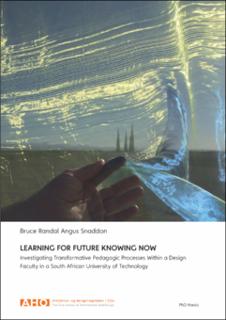Learning for future knowing now : investigating transformative pedagogic processes within a design faculty in a South African university of technology
Doctoral thesis
Published version
Permanent lenke
https://hdl.handle.net/11250/2678251Utgivelsesdato
2020Metadata
Vis full innførselSamlinger
- Design [33]
Sammendrag
Design educators working in higher education institutions face the enduring challenge of translating creative design practice into pedagogy and curricula that prepare students for entry into the world of work. This not only entails keeping up with current and given modes of designing but also requires critical attention to how the practice and discipline of designing, with its material and increasingly immaterial outcomes, are shaping and being shaped by a fast-paced, complex and connected world. This includes how design practice, education, and research have progressively moved from linear views of designing as problem-solving to include more collaborative platforms and approaches. Design courses need flexible curricula and dynamic pedagogical approaches to address and respond to such flux, the changing needs of society and, importantly, the role of sustainable design concerning the current climate crisis.
In this thesis, I take up the question of how design educators can actively explore different approaches to design pedagogy that might enable a transition for design education towards longterm sustainability. Such transition includes a critical review of how and where design learning might be carried out, so as to break with hegemonic orthodoxies in design practice, its education, and in broader society. Consequently, this thesis is a practice-based inquiry into the need to shape design curricular and pedagogical activities to meet future work and professional practice as well as the burgeoning fields of design for sustainability and social innovation in an unsustainable world.
In the case of this study in a South African university of technology (UoT) environment, student designers need to learn how to work with complex settings such as designing for developing world issues in contexts of heightened socioeconomic and political inequality, and the changing demands and needs of clients, communities and policy, to mention a few. In shaping and connecting suitable and productive relations between design practice and design pedagogy, this study investigates currently ill-defined literacies and learning that might be appropriate for these domains of design and their emergent impact. As such, this thesis brings to the fore the ‘relearning’ taking place in a South African UoT through experimental pedagogy at the crossroads of design, sociocultural learning theory, and critical posthuman perspectives.
The key research question that is addressed in this study is: How might current design pedagogy transition toward emerging and complex contexts through curricular experimentation that is oriented towards sustainable futures by design? The study is conducted as participatory action research and is practice-based with a focus on a participatory mode of pedagogical praxis. Consequently, the study comprises an inquiry into a range of design project-cases over five years that aimed to enhance learning practices, resources, and reflections as part of a wider pedagogical shift toward learning about sustainable design in the context of climate change.
The main contribution of this study is a pedagogical framework that comprises a set of mutually reinforcing modalities and navigational principles for design education in a transitioning reorientation towards long-term sustainable design practice. This study may resonate with and provide useful insights for designer-educator-researchers who are engaged in transitioning their pedagogy away from the dominant market-driven paradigm that continues to inflect design education and practice.
